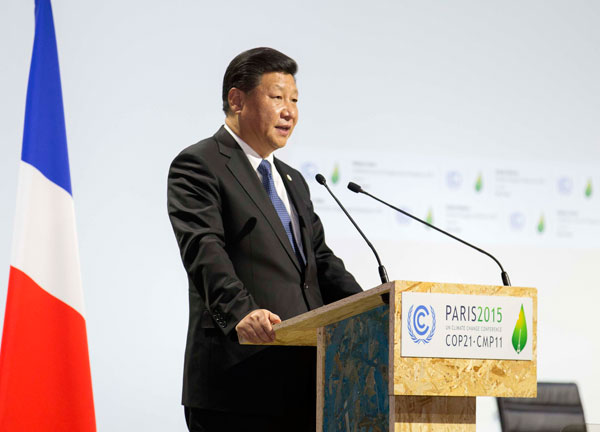Theoretical innovation crucial to major-country diplomatic practice

Chinese President Xi Jinping delivers a speech for the opening day of the World Climate Change Conference 2015 (COP21) at Le Bourget, France on Nov. 30, 2015.
2015 is the year when China comprehensively promoted major-country diplomacy with Chinese characteristics. In this critical year of the rejuvenation of the Chinese nation, China leaped forward in terms of improving its international influence, promoting diplomacy, and planning and implementing the “One Belt, One Road” initiative.
To keep up with the rapidly developing diplomatic practice, a theoretical framework for major-country diplomacy with Chinese characteristics needs to be established, scholars said at a recent symposium hosted by China Foreign Affairs University.
China initiatives
The official launch of the Asian Infrastructure Investment Bank on Dec. 25 marked the establishment of the first multilateral financial institution initiated by China, which is also a microcosm of China’s diplomatic innovation.
Ren Jingjing, an associate research fellow from the Institute of Contemporary China Studies at the Chinese Academy of Social Sciences, said that in trade diplomacy, China proposed a series of new concepts, such as an upgraded China-ASEAN Free Trade Area and a Free Trade Area of the Asia Pacific, effectively mapping out a regional trade network, while in financial diplomacy, China constantly promoted financial development and RMB internationalization through financial and currency cooperation.
In investment diplomacy, China is fully committed to reaching investment-protection agreements with related nations, providing a safe and favorable global environment for China enterprises to “go global,” Ren added.
Such measures accelerated the “dual transformation” of China’s economic diplomacy, Ren said. Its focus has shifted from serving domestic economic development to balancing that with the overall diplomatic strategy. At the same time, China has become an active player in shaping the rules and agenda of the international economy rather than a bystander.
“China’s diplomacy has transformed from a two-dimensional one to a comprehensive one,” said Zhao Kejin, an associate professor of International relations at Tsinghua University.
Zhao said that since the 18th CPC National Congress, China’s diplomacy has shown new features on the basis of inheriting the basic framework, including from “crossing the river by feeling for stones” to the top-down design, and from centralized to integrated and coordinated management.
Moreover, new diplomatic means have been highlighted, such as leadership, urban and public diplomacy. In particular, China has proactively advocated international institutional reform and the construction of a new international system, Zhao said.
Community of common destiny
From the 2015 Boao Forum for Asia annual conference, the UN summits, to the recent second World Internet Conference, Chinese President Xi Jinping repeatedly mentioned the phrase “community of common destiny.”
Wang Cungang, a professor at the College of Politics and Administration at Tianjin Normal University, said that the idea is well embodied in China’s neighboring diplomacy, policy toward Africa and a common, comprehensive, cooperative and sustainable security strategy for Asia.
“The concept will continue to play a leading role in China’s diplomacy,” Wang said.
Wang Yiwei, a professor at the School of International Relations, Renmin University of China, said that a community of common destiny is not an ideological concept. It surpasses the Western alliance and hegemony system to represent the interests and aspirations of massive developing countries, manifesting the Oriental wisdom of “the man of perfect virtue, wishing to be established himself, seeks also to establish others; wishing to be enlarged himself, he seeks also to enlarge others.”
Wang said building a community of common destiny does not contradict core national interests because the prerequisite of such a community is core national interest, but not at the expense of that of other countries. Instead, it pursues the tolerance and recognition of different interest groups, eventually resulting in the formation of common interest.
Enhancing four forms of awareness
The constant innovation in diplomatic practice and theory has put up higher requirements for academic studies.
Scholars said that the “four forms of awareness” should be enhanced to build a theoretical framework for major-country diplomacy with Chinese characteristics.
The first type of awareness relates to enhancing strategic planning. Studies should not be based on simple theoretical deductive reasoning, but should gain a broader vision to take into consideration domestic and international situations as well as diplomatic practice.
The second pertains to enhancing awareness of innovation. In the face of new situations and challenges, academics should constantly innovate, particularly in regard to theories that are centered on the fundamental interests of China.
The third is remaining aware of hardship. China is on its way to becoming a great world power and realizing the great rejuvenation of the Chinese nation, so we cannot afford to be impulsive and blind in making strategies.
Finally, China must enhance its awareness of tolerance. Academic research should follow the principle of win-win cooperation to truly promote and guide diplomatic practice.
Mao Li is a reporter at the Chinese Social Sciences Today.
